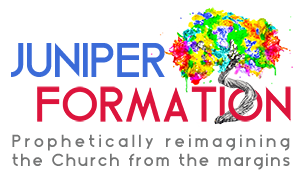Holy Week: Discerning What it Means to Love One Another Justly
This post was written on March 20, 2023
I’m sitting in the old State Library in the Colorado Capitol Building in downtown Denver, thinking about Holy Week as I wait for my name to be called to give testimony in support of SB 23-190. This bill seeks to protect pregnant people from deceptive and coercive marketing and practices of so-called “pregnancy crisis centers,” which are funded and run by conservative Evangelicals and Catholics. Candace Woods, a Juniper Formation Member-in-Discernment (a person in the ordination process in the United Church of Christ), is here too to give testimony from Colorado Springs via Zoom. The bill has now passed both the Colorado Senate and House and is awaiting being signed into law.
My neighborhood of Southwest Denver is ethnically diverse and lower income. It is a place where deceptive pregnancy-related services are advertised, which does not happen in wealthier white neighborhoods in Denver.
I also briefly served a mountain church in Evergreen, CO, where there was a non-medical “pregnancy crisis center” down the street from the church.
My experience of these crisis pregnancy centers is that they are unethical, coercive, and predatory. Their practices are not medically nor scientifically sound, and the centers often do not have medically trained staff. They misinform pregnant people about their bodies, the development of the fetus, and available medical options. Sometimes they intentionally cause pregnant people delays that prevent them from accessing abortive options depending on state laws.
As I think about Holy Week, I am concerned about the emotional and spiritual tactics and manipulation that these “pregnancy crisis centers” use to coerce pregnant people.
I’m concerned about how we all, especially the Church, employ emotional and spiritual manipulation, both intended and unintended—in our theology; our Church power structures, policies, and processes; our legislative advocacy; and in our relationships to one another and God.
There is both a gift and a potential for manipulation when we encourage one another to experience the full range of human emotions. The gift is to connect so deeply in relationship to God, our selves, and one another that our bodies and minds twist, bend, expand, and retract in at the intersection of our inner and outer worlds.
Holy Week is the season on the Christian calendar that invites us into an emotional rollercoaster. We begin with the intimacy of Maundy Thursday and move on through the week from there:
An intimate seder meal shared by Jesus and the disciples.
A loving blessing offered in broken bread and a shared cup.
Hearts twisted by the betrayal of Judas.
Anxious air filled with deep fears of persecution for all followers of Christ.
Gut-wrenching pain watching someone you love being whipped and publicly
shamed—carrying the burden of dragging their own torture device.
The helplessness and hopelessness of watching your prophet, friend, and your
faith crucified.
The breathlessness of death.
The utter loss, emptiness, and disorientation of the nights and days after.
The loving grief care of Mary and Martha transformed into messengers of joy and
transfiguration.
The disbelief of doubting Thomas.
The complexity of a whirlwind of emotions, left to figure out what is next.
And then the Spirit arrives for each of us to inspire and guide, to offer us gifts of the Spirit so that we may love one another the way our Creator loves us.
Yet still, unknowing, fear, trepidation, conviction, confidence followed by total loss of confidence, only to be bolstered once more.
An ongoing rollercoaster of seeking out the path of Christ, forever and ever. Amen.
Holy Week feels like life wrapped into a few days, the undulating back-and-forth. Waves of emotions, experiences, relationships, pain and suffering, joy and celebration, and everything in between.
We can choose to experience Holy Week in the fullness of life, a promise of God’s undying Spirit amidst injustice, or allow heightened emotions to manipulate our theology—or understanding of God.
Many have been taught by the Church that Holy Week is about God killing God’s own son, and that we are “saved” by this divine filicide—the intentional act of a parent killing their child.
Some are taught that the cross, a symbol of torturous state murder—a lynching tree, is the symbol of our faith.
The cross is the symbol of unjust power over those on the margins, those preaching hope, love, and inclusion—not a symbol of our faith or God.
The symbols of our faith are the life and teachings of Jesus and the abiding Spirit, breathing life, teaching us the ways of love, despite the pain and injustice we experience and also wage on others.
Again, I’m concerned about how we all, especially the Church, employ emotional and spiritual manipulation, both intended and unintended.
I wonder what your experience is of Holy Week, both this Holy Week and the Holy Weeks that permeate our daily lives throughout the year?
Where are you emotionally aligned with the Holy Spirit?
Where might you be emotionally manipulated or manipulating?
How can we be in the ongoing practice of exploration, to discern—spiritually determine, what it means to love each other justly?
Some days it looks like giving testimony in support of pregnant people.
As a recently pregnant person, I can attest that pregnant people deserve better comprehensive medical care, community care and support, education, and resources.
At the very least, we deserve the truth and bodily autonomy without deception, manipulation, and pseudoscience. And in the United States, where we claim a separation of Church and state, pregnant people deserve medical care that is not compromised by religious extremism.
I hope for this Holy Week, and for all the holy weeks to come, you are able to discern what it means to love one another justly in the path of Christ.
In Partnership,
Rev. Dr. Jenny Whitcher, Ph.D (she/her)
Minister of Prophetic Formation
jenny@juniperformation.org
Call/Text: 720-580-2274

